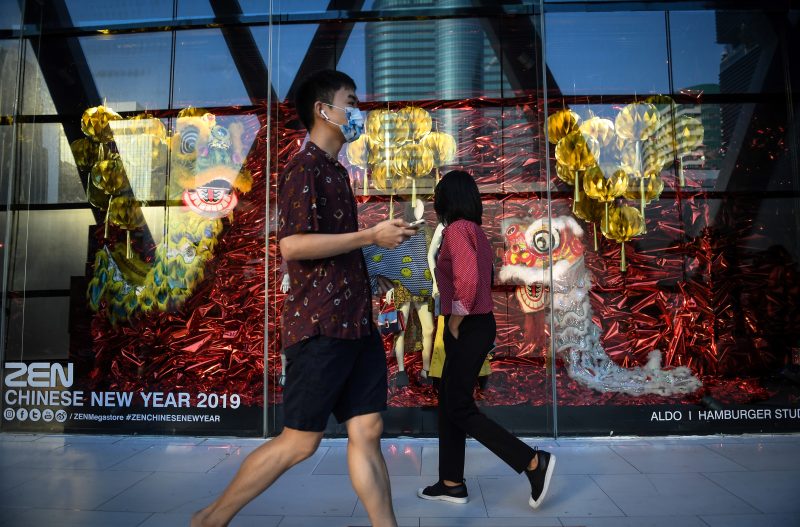Thai junta pegs economic fortunes to China as uncertainty looms
The race for Chinese cash has unsettled many Thais concerned by the warping of their markets by China’s massive economy (Lillian SUWANRUMPHA)
Bangkok (AFP) – After generals seized power in Thailand in a 2014 coup they turned to Beijing to kickstart growth and buff up their vision of an innovative, developed country steered by wise leaders and buoyed by China-backed infrastructure.
Thailand’s economy sagged in the first years after the power grab but the junta is staking its hopes for an economic turnaround on the Asian giant.
Yet concerns are mounting of an over-reliance on Beijing and the opacity of deals cemented by the generals.
Few can predict what will happen in a country known for coups and backroom political plots — uncertainty that was in focus last week after the king scuttled a bid by his sister for prime minister.
Junta chief Prayut Chan-O-Cha is looking to hold onto power and drive through the largest investment programme in Thai history — with China’s help.
Tourism remains the kingdom’s banker — accounting for a fifth of the economy — and Chinese visitors are integral, making up a quarter of Thailand’s projected 41 million visitors this year.
Lavish Lunar New Year celebrations at the start of the month, including Chinese acrobats, arts, crafts and dragon dances, were expected to rake in over $300 million.
Wang Ziying was among those who took part, emerging from a mass of incense-wielding devotees at a Bangkok shrine — one of more than 11 million Chinese expected to visit Thailand this year.
“Travelling here is quite cheap,” said Wang, 27, with red bunting and lanterns festooning the streets around her.
Last year, tourist Xu Xiao, 28, prayed at the same shrine for a successful marriage.
Her husband was with her this time.
“Thailand is a country full of warm-hearted people,” she said.
– Bet the house –
Chinese investment in Bangkok condos is surging, while international schools are being filled by parents tiring of Shanghai and Beijing prices.
But junta critics say the rush for Chinese investment, carried out with virtually no public scrutiny, has left Thai markets vulnerable to price manipulation and economic shocks.
Thai rubber was hit hard by the trade war between the United States and China, while concerns abound over inducements likely to be offered to investors in special economic zones.
“Thailand has shown signs of overdependence on the China market,” said Michael Montesano, coordinator of the Thailand Studies Programme at Singapore’s ISEAS-Yusof Ishak Institute.
Approved investment deals from China in the first nine months of 2018 stood at 20 billion baht ($640 million), nearly double the amount recorded over the entire previous year, according to Thailand’s Board of Investment.
But the junta’s flagship project, the Eastern Economic Corridor, aims to dwarf that.
A mix of tech, airport and port upgrades, high-speed rail and manufacturing, the EEC is a $45 billion plan across three eastern seaboard provinces, and Thailand is courting investors from several countries.
“But without the kind of Chinese investment they are hoping to get, the Eastern Economic Corridor doesn’t get off the ground,” said Benjamin Zawacki, the author of “Thailand: Shifting Ground between the US and a Rising China”.
Late last year, Thailand hosted more than 500 Chinese executives and investors, selling the EEC as a link to Southeast Asia to satisfy Beijing’s Belt and Road infrastructure initiative.
But junta opponents are on the lookout for any deals hustled through in the run-up to next month’s election before a new civilian administration takes power.
The generals have also spent large sums on Chinese military gear, unencumbered by oversight.
Junta number two Prawit Wongsuwan has served as the frontman, buying tanks, guns and three submarines — costing nearly $400 million each — that have yet to be delivered.
– Thailand 4.0 –
Once Southeast Asia’s most dynamic economy, Thailand has been beset by protests and political instability since an earlier coup in 2006, a period dubbed the “lost decade”.
In that time, Thailand’s education system calcified.
Shortly after their last power grab, the generals imposed fresh layers of rote learning across schools, focusing on loyalty to the monarchy, discipline and national pride.
Yet junta leader Prayut has simultaneously touted a future of “Thailand 4.0” — a tech hub fed by highly-skilled, educated Thai workers.
To buttress the vision, a $320 million investment last year by e-commerce giant Alibaba was hailed by Prayut and Chinese entrepreneur Jack Ma as a sign of the bounty to come.
But critics say a woeful education system cannot feed into a pipeline of skilled workers without massive reform.
The race for Chinese cash has unsettled many Thais concerned by the warping of their markets by China’s massive economy.
A “pro-China stance” has been criticised by a wary Thai public, independent analyst Sasiwan Chingchit said, especially those affected by the government’s “poor performance”.
“A lot of people… are so sick of this government,” she said.
Disclaimer: This story is published from a syndicated feed. Siliconeer does not assume any liability for the above story. Validity of the above story is for 7 Days from original date of publishing. Content copyright AFP.


